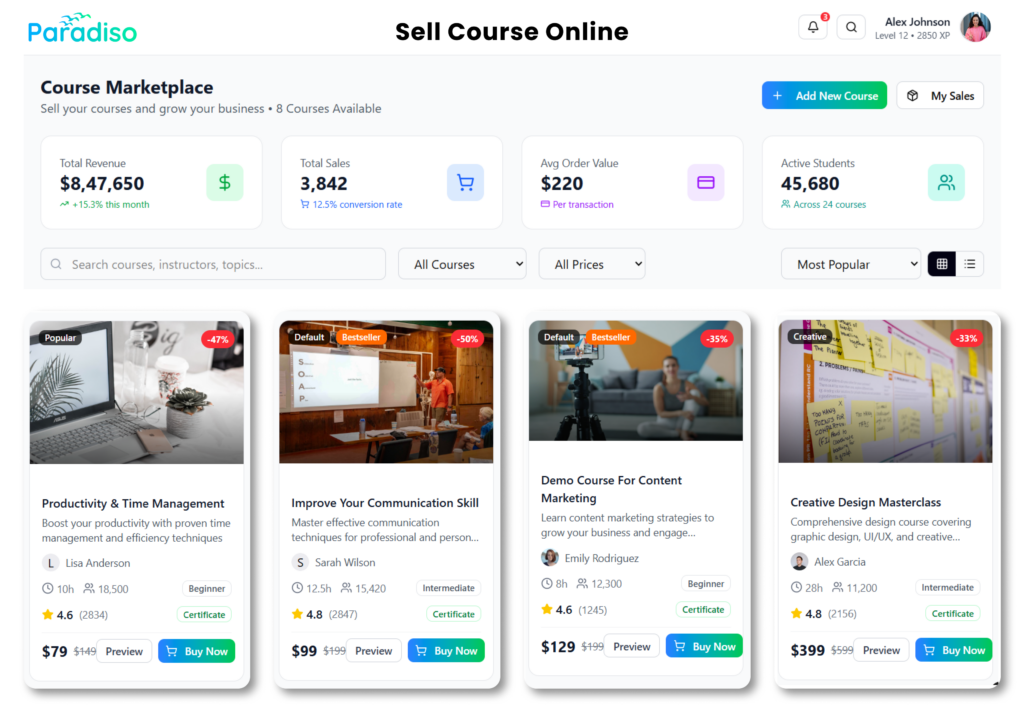In today’s world, delivering your employees and customers the necessary resources and training materials for success is crucial. To accomplish this, a learning management system (LMS) can help businesses take their employee and customer experience to the next level. However, selecting the right system can be daunting with so many LMS options available for small businesses and startups.
That is why we are here to guide you. Evaluating your resources and training requirements is essential to find the best LMS for small businesses. Whether searching for an LMS to create from scratch or replace an existing learning platform, we suggest exploring the following options to get the best return on investment from your LMS for small businesses.
How your LMS can help your business
Many small businesses might think a learning management system (LMS) is too expensive, but it is an investment that can pay off in the long run. In addition, an LMS can provide many benefits to your business. Here are a few examples of how an LMS can help you:
Enhance Employee Onboarding and Training Process
Dynamic employee training and onboarding are crucial for small businesses as they impact retention rates and employee perception. Almost half of the employees who receive poor training leave their jobs within a year, leading to higher turnover rates and expenses.
A learning management system (LMS) can improve onboarding and prevent high turnover rates by offering a better learning experience. Operative training involves providing the right resources to help employees learn and retain information.
Small businesses can implement a blended learning approach, combining eLearning modules with face-to-face training or allowing employees to choose their eLearning courses. An employee-centered onboarding experience is vital; an LMS is a valuable tool for achieving this.
Give you an improved learning experience.
An advantage of using an LMS is that it allows small businesses to replace traditional in-person courses with eLearning modules. It not only saves time but also cuts costs. Additionally, employees benefit from this approach because they can access any course within the LMS and complete it at their own pace.
It leads to a more positive learning experience, as shown by a 2016 survey where 97% of LMS users reported that it improved training and tracking.
Investing in an LMS can increase employee productivity and engagement, outweighing the initial expenses with long-term benefits. Therefore, it is a worthwhile investment for small businesses looking to save time and money while enhancing their training programs.
Seven Tips to Find the Best LMS for Small Companies
Choosing the right learning management system is essential for new or established businesses. With the LMS market predicted to hit $28 billion (about $86 per person in the US) by 2026, deciding which LMS is best for your company is challenging. However, some tips can help you find the ideal learning management software for your business needs. LMS options are available to help you stay on top of industry trends and provide the necessary resources for employee learning and development.
1. Choose your options wisely
Selecting the right corporate learning management system (LMS) is crucial to meet your company’s training needs. There are various LMS options in the market, each with pros and cons. Therefore, your decision should be based on your company’s requirements and objectives.
Firstly, determine the type of training you will offer – online courses, in-person classes, or both. Secondly, consider the course delivery method. For example, some LMSs are better for online delivery, while others are more suited for in-person classes.
Lastly, think about your budget. Price is one of the most critical factors to consider when buying a learning management system for small business, according to a study by eLearning Industry. Ultimately, your learning management system should meet your business’s needs.
2. Emphasis on Free LMS Options
Take advantage of free options if you’re looking for the best LMS for small companies. Plenty of high-quality, free LMSs can save you money while offering all the features and functionality you need.
When evaluating free LMS options, ensure the system is easy to use, can handle your content and learners, and integrates with any other software or tools you already use.
For instance, if you use accounting software for invoicing, your LMS should integrate without issues. Ultimately, the cost of an LMS should encourage you to find the best solution for your business.
3. Ask for suggestions from others
An effective learning management system can help businesses and educational institutions in various ways but choosing the right one can be challenging. One approach is to ask for suggestions from others who have already used an LMS.
It can help you learn about other systems’ different features and ease of use. It can also help you avoid any hidden costs of using the LMS. According to research, the education industry accounts for about 22% of the global LMS market, indicating that educational institutions can also benefit from these systems to deliver courses and track student progress.
Whether you’re looking for an LMS for a small business or school, asking for recommendations from those who have already used it can be a good starting point in your search for the right system.
4. Maximize ROI with the best LMS
Selecting the best LMS for small businesses is crucial, and one factor to consider is the return on investment (ROI). The main question is whether the LMS will increase your company’s profits. Although there’s no guarantee, there are ways to increase your chances of getting what you pay for.
Start by assessing the system’s cost, including implementation and maintenance expenses and any hidden charges. Then, consider how the LMS will save time by automating processes and increasing employee productivity.
A suitable LMS can help you save money and time while improving employee performance. However, remember that a good ROI depends on selecting the best LMS for small businesses that meets all your needs.
5. Watch LMS Software Training Videos
When choosing an LMS, it’s helpful to watch training videos to understand better how the system works and its features. However, there are a few things to keep in mind when watching these videos:
- Ensure that the videos are current and made for the latest version of the LMS.
- Pay attention to the quality of the production, as you want to ensure that the videos are understandable and easy to follow.
- Ensure the videos are comprehensive and cover all the key features of the LMS.
Watching training videos can help you determine if a particular LMS is the right fit for your business or organization.
6. Ask vendors about Installation and Support options
When choosing an LMS for a small business, it is essential to consider installation and support options. Some LMS providers offer complete installation solutions, including software installation, data migration, and user training, while others provide only the necessary tools for self-configuration.
Choosing an option that fits your business needs and technical expertise is essential. Moreover, LMS support is crucial to ensure the smooth operation of your system. Different providers offer various customer support levels, and the quality and availability of help may differ.
Therefore, asking vendors about their available support options is essential before selecting an LMS. A reliable LMS with complete support can maximize the system’s benefits and minimize downtime.
7. Choose an LMS that fits Your Business Processes
Finding one that integrates well with your current business processes is essential to ensure an effective learning management system. A good LMS should make tracking employee progress and compliance with training requirements easy and provide a way to create and deliver courses efficiently.
To find the best LMS for your business, evaluate your current business process management and ensure any potential LMS has integration capabilities that will work seamlessly with the tools you already use.
Consider further integrating your LMS with business management software to streamline your processes. To get started, check out a list of the best business process management platforms to ensure you maximize your LMS investment.
Try Paradiso Free for 30 days
Paradiso CourseCart is everything your online business needs.
All in one place
Why should small businesses choose Paradiso LMS?
Paradiso’s Corporate LMS can help your business by providing an integrated, easy-to-use platform that simplifies learning and development. By providing a centralized hub for all your training content and resources, Paradiso’s Corporate LMS makes it easy to quickly and efficiently deliver training programs to your employees. The platform also offers advanced reporting and data analytics capabilities to help you measure your training initiatives’ effectiveness and identify improvement areas.
Additionally, the platform provides features such as gamification, surveys, and quizzes that can help engage employees and maximize the impact of your training initiatives. With Paradiso’s Corporate LMS, you can easily create, deploy, and track the progress of your training programs for better results.
Paradiso LMS for corporate training can suit all tailored demands, including onboarding, compliance, and product training. The best corporate LMS software offers many benefits.
Let’s look at some corporate LMS perks for business training:
- It Saves Time and Reduces the cost
- More scalable and adaptable
- A better retention rate for employees
- A centralized way of managing your content
- Easy performance tracking
Discover the best LMS for small businesses.
It is essential to choose a learning management system that suits the culture of a small organization rather than just looking at the number of features it offers. In addition, other factors, such as SCORM compliance, industry certifications, and integration with third-party tools, can help determine the best small business LMS. One good way to start looking for the right learning management system for small business is to consider these factors.
Paradiso LMS can be an excellent option for small businesses, as it offers these features, no hidden charges, and optional upgrades like off-the-shelf courses. In addition, it can help you train your team and improve their productivity.














